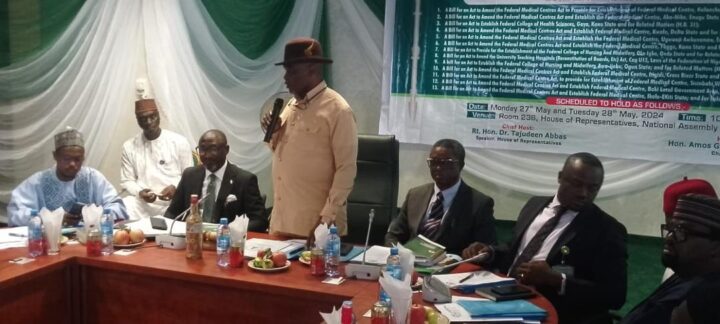Gboyega Oyetola, minister of marine and blue economy, says the ministry is “eager” to partner with stakeholders for a regulatory framework in the sector.
Oyetola spoke in Abuja on Monday at a public hearing organised by the house of representatives committee on shipping services on a bill to repeal and enact the Shippers’ Council Act 2024.
Oyetola, who was represented by Oloruntola Olufemi, permanent secretary of the ministry, said the activities in the sector need to be regulated in line with global best practices.
“The federal ministry of marine and blue economy, since its inception, is eager and willing to partner with all stakeholders in the sector, especially the national assembly to enthrone the regulatory framework for the marine and blue economy sector,” the minister said.
Advertisement
“The ministry is happy to be a part of the process for informing the sector and enthroning an enabling act to guide the regulation of the sector.”
Pius Akutah, executive secretary of the Nigerian Shippers Council, said the bill seeks to create an enabling environment for private sector investment.
Akutah said the bill aims to promote efficiency in the provision of shipping and port services, enhance ease of doing business, minimise the high cost of doing business at the ports, and prevent its inflationary effects on the Nigerian economy.
Advertisement
“The bill promotes the implementation of relevant trade facilitation instruments to ensure seamless movement of cargo across trade corridors,” he said.
“Regulation is not strangulation, rather, it is an effort to create a level playing field in an industry, to entrench fair trade practices, certainty, and transparency.
“In order not to add to the cost of doing business, the bill retains the one percent freight stabilisation fee as the source of funding for the agency.”
Tajudeen Abbas, the speaker of the house of representatives, said the bill will formally empower the council if passed into law.
Advertisement
He added that the bill will provide the council with the authority and tools required to oversee and manage the economic activities within Nigerian ports, ensuring efficiency, fairness, and competitiveness across the sector.
Represented by Sada Soli, chairman of the house committee on water resources, Abbas said the bill lays out financial provisions, specifying guidelines for the allocation, management, and auditing of funds.
This, the speaker noted is crucial for maintaining financial integrity and providing the council with the necessary resources to perform its duties.
“The bill also addresses offences and penalties, outlining specific non-compliance issues and their corresponding penalties,” Abbas said.
Advertisement
Also speaking, Boma Alabi, a senior advocate of Nigeria (SAN) and chairman of the Shipping Lines Association of Nigeria (SLAN), said regulations targeted at enhancing efficiency and removing bottlenecks are essential for the sector.
“We must be more efficient, and we welcome this regulatory agency that will be created to make things more efficient,” Alabi said.
Advertisement
“We have expressed our concern internally and externally, and this committee, which has been involved in this process, must work on some areas of concern.”
Advertisement
Add a comment






